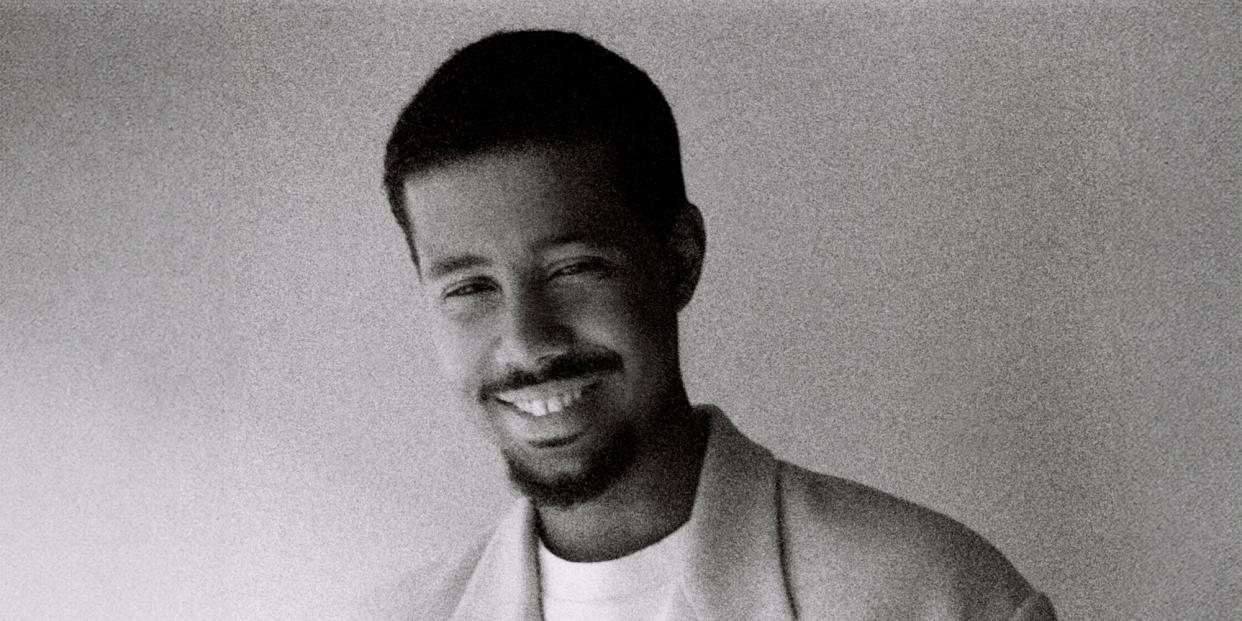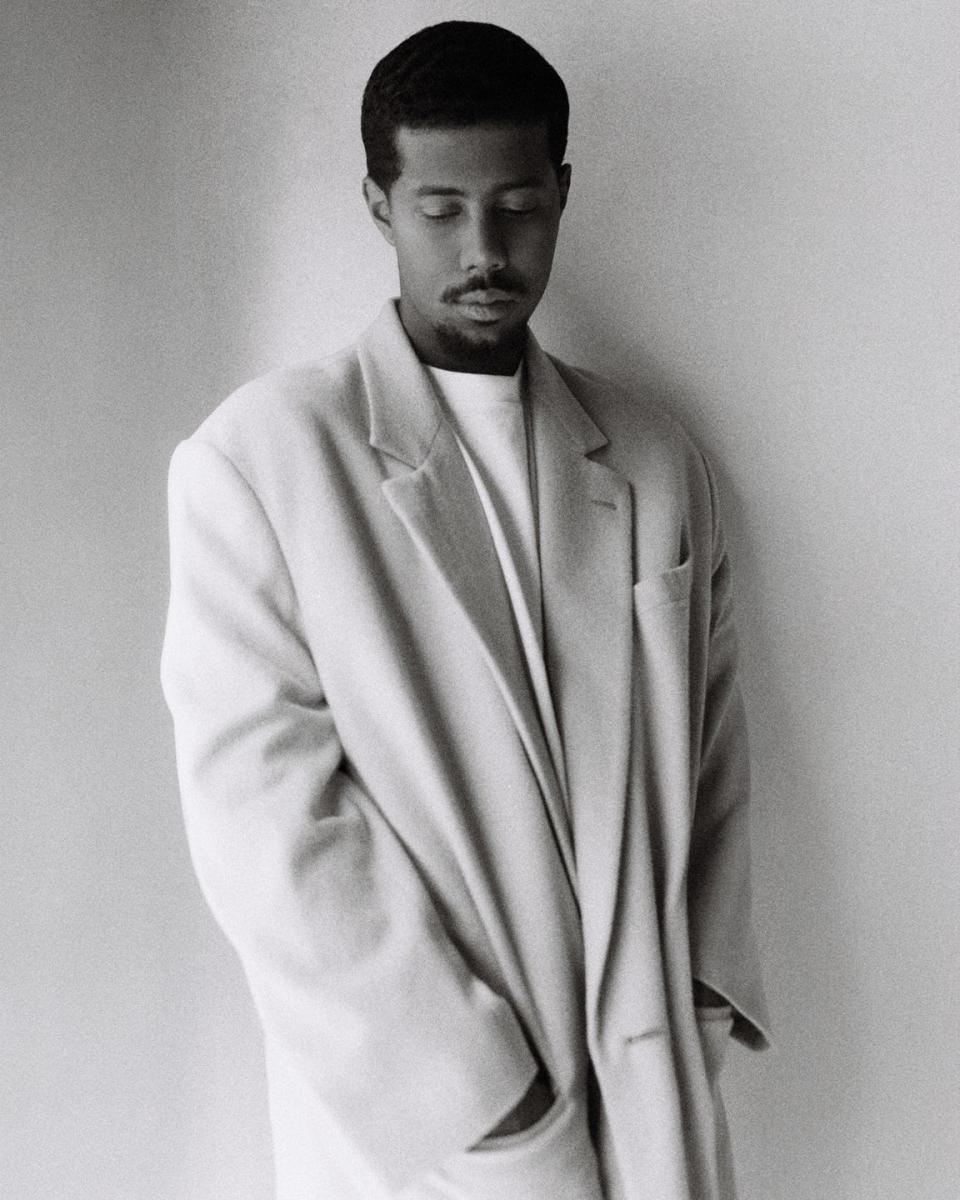On His New Album ‘Dunya’, Mustafa Is Keeping the Faith

Three years ago, I was sitting on a floor cushion in a small Soho venue as a folk singer entranced the room with his poetry and ethereal voice. He sang about loss, and, with the memories of the pandemic still fresh, the room was transfixed. Now that singer – known as Mustafa or Mustafa the Poet – has released his equally bewitching debut album, Dunya.
Loosely translating from Arabic as “the world in all its flaws”, Dunya traverses themes of loss, love and culture. The songs intertwine Arabic scales, East African folk music and acoustic sounds alongside lyrics about faith, friendship and fallout from violence in Toronto, Canada and Gaza, Palestine. “Life, death and art are inherently political,” the 28-year-old tells me over Zoom from Los Angeles, between album listening events featuring conversations with Dua Lipa, comedian Ramy Youssef and model Anok Yai.
Mustafa was born and raised in Regent Park, downtown Toronto and is of Sudanese heritage. He first received accolades as an award-winning poet and songwriter for artists including The Weeknd, Justin Bieber and Camila Cabello and found new audiences with the release of his critically acclaimed and soul-stirring EP, When Smoke Rises, in 2021. Since then, he has used his voice to highlight violence and gentrification in his hometown and curated benefit concerts raising thousands for humanitarian crises in Gaza and Sudan. “There are people in the world who may not know if I don’t communicate it and there are many trying to protect their relationships with people of power," he says. "But, for my peace of mind, I need to know that I did what I could.”
Dunya is predominantly a folk album, saturated with soft, soothing vocals, but Mustafa explores conflicts there, too, such as in the single “Gaza Is Calling” (the video for which features his friend, Bella Hadid). “When I made the record, [Gaza] wasn’t in the height of such violence. I was performing some of these songs in Sudan two years ago,” he says. “To see the record recontextualised, all I can hope is to be is a reminder of our truth and of a people who are actively working against systems that are infringing upon their rights to live.”
The album is eclectic, as are his notable collaborators on it. “With Rosalía, there were these parallel rhythmic elements that existed within flamenco and East African, Nubian and Arabian music. With Clairo, she is a wealth of knowledge when it comes to 70s and 80s music and we’ve exchanged that through the years,” he says. He also worked with Aaron Dessner of The National, Taylor Swift’s current go-to, as well as his friends. “Puffy L’z, a Somali rapper from Toronto, and DJ Dahi understood what I wanted to represent in terms of the energy of my hood,” he says.
If it were not clear from his collaborative work ethic, Mustafa, who is a practising Muslim, describes himself as an extrovert. “Every time I go to the mosque for Friday prayers, I’ll end up having a 20-minute conversation with a stranger. I’ve been that way across the board,” he says. Some studio sessions with other artists have turned into insightful conversations, with no music made.
Mustafa's relationship with religion has clearly been a grounding constant in his professional life, though it hasn't always been easy. “I tried to separate my religion and career at a point in time, as some were increasingly uncomfortable with the conflation of my artistic expression and faith," he says. "And I tried, but so much of my life is connected to Islam. Just like these songs are never complete, neither is the process of worship.”

Mustafa has written about the gun violence in his hometown, and he has known grief. “A part of me is envious of people who have had the same friends for decades, as because of the circumstances I’ve grown up in, some of the people I love are no longer here,” he says. But as he neared the completion of Dunya, Mustafa experienced another heartbreaking loss – his elder brother, Mohamed, was fatally shot in the city.
“The songs were nearly done and dealing with the mundanity of finishing a record while grieving was difficult. I thought I’d never put it out as it felt like the end of the world,” he says. “I was also being suffocated by world issues that made me feel lost in my journey as an artist, but I was also aided by how little everything mattered in that time so that’s what I focused on.” On the heartrending track, “Leaving Toronto”, he sings: “If they ever kill me, make sure they bury me next to my brother.”
What would he like the album’s legacy to be? “[I want it to be] of a Black, Muslim boy who maintained his softness in the face of turmoil and failed, failed and failed again yet still maintained that softness," Mustafa say. "It’s easy to exchange it or give it up because it’s difficult to feel it all, all of the time, but I never did and I feel so grateful for holding on.”
‘Dunya’ is out now
You Might Also Like

